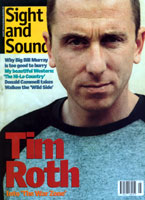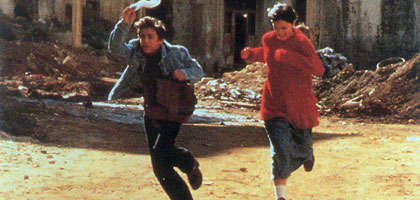Primary navigation

France/Lebanon/Belgium/Norway 1998

Reviewed by Geoffrey Macnab
Our synopses give away the plot in full, including surprise twists.
Beirut, Lebanon, 1975. As fighting breaks out between the Lebanese Muslims and the Christian militias, the city is split in two: East Beirut is Christian-controlled and West Beirut is Muslim. The social and political upheaval has a dramatic effect on the life of Tarek, a teenager at school, and his parents. His mother wants to leave Beirut but his father is determined to stay.
At first, Tarek relishes the disruption since it means he can escape school. He runs amok in the bombed-out streets with his friend Omar and May, a beautiful young Christian girl. Tarek and Omar have a Super-8 camera, but the store which develops their films is on the other side of town. Tarek ventures across 'no man's land', a dangerous zone. On one of his missions, he comes across a famous brothel where Christians and Muslims alike are welcome and where he meets Madam Oum Walid, who is amazed by his audacity and treats him with kindness. The months pass and the war shows no sign of ending.
Bombed-out cities make wonderful playgrounds, and it's this paradox which writer-director Ziad Doueiri (who himself grew up in the war-torn Beirut of the mid-70s) explores to such rich effect in his debut feature. While their parents are tearing their hair out in grief and fear, the children run amok, relishing the anarchy which war brings. Doueiri's background as Quentin Tarantino's assistant cameraman has been much hyped by the publicists, but West Beyrouth owes less to Reservoir Dogs than to the kind of naturalistic, street-level cinema patented by the Neo-Realists in the 50s. Doueiri is equally adept at showing the tensions between neighbours living on top of one another and the divisions within the city as a whole.
There is also conflict between generations - while Christians battle against Muslims, adolescents are pitted against their elders. In one of the very first scenes, the teenage protagonist Tarek refuses to sing the French anthem at his school assembly. Robustly played by the director's younger brother Rami Doueiri, Tarek is a renegade with the same disdain for authority that Truffaut's Antoine Doinel showed in The 400 Blows (1959). For all his bravado, he is sensitive enough to understand the strains the war is placing on his parents' marriage. Doueiri never lets us forget what a calamity the war is. Tarek's long-suffering but philosophical father insists it is just another episode in the chequered history of Beirut, a city riven by violence many times before. He seems to believe that if the family endures long enough, the violence will go away but, of course, that's not going to happen.
Without going into exhaustive detail about why the fighting between Beirut's Muslims and Christians broke out, Doueiri shows its effects. Militia men mount roadblocks at street corners. We see a massacre of bus passengers. As bread becomes short, crowds swell outside the bakery. Rows break out for almost no reason. The war zone has its own conventions, some of them painfully absurd. In no man's land, bras stand in for white flags and no sniper will shoot at anybody brandishing one, which fascinates Tarek, his curiosity about sex quickly mounting.
West Beyrouth is not only a chronicle of a city at war but also a rites-of-passage story and as a study of young friendship. Tarek and his friend Omar roam around the city in search of adventure, sometimes with a young Christian girl in tow. This is very much an insider's vision of Beirut. The director knows the city as intimately as the people who inhabit it. The storytelling isn't exactly impressionistic, but we're given little sense of time passing or of a narrative building up to a conventional ending. Instead, Doueiri offers us a series of lyrical snapshots of the world of his childhood. The film finishes in oblique fashion, with the implication that one of Tarek's family died in the civil war. Doueiri doesn't need to spell matters out - the sense of loss and yearning felt by those caught in this divided city is always apparent.